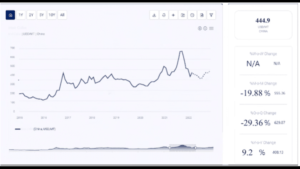
The maritime industry is on the brink of a technological revolution. With innovations in digital navigation, fleet management, and cyber defense, the modern seafarer must be well-versed in the latest tools and strategies to stay ahead.
This blog post aims to guide maritime professionals through the complexities of contemporary maritime solutions, providing insights and practical tips to help you chart a course through the digital seas.
Introduction Navigating the Future of Maritime
The maritime industry, steeped in tradition and history, is rapidly evolving. Digital advancements are reshaping how we operate, manage, and secure maritime ventures. For maritime professionals, understanding these modern solutions is crucial. This blog will explore various facets of digital maritime solutions, from navigation technologies to cyber security, offering valuable insights to help you adapt and thrive in this dynamic landscape.
The Rise of Digital Navigation
Transforming Traditional Tools
Traditional navigation methods have long relied on manual plotting and celestial navigation. While these skills remain valuable, digital navigation tools have brought unprecedented accuracy and efficiency.
Today’s Electronic Chart Display and Information Systems (ECDIS) integrate GPS, radar, and AIS data, providing comprehensive situational awareness. These systems not only enhance safety but also streamline route planning and fuel management, ultimately reducing operational costs.
Benefits of ECDIS
ECDIS offers several benefits, including real-time updates, automated route planning, and integration with other ship systems. This technology reduces the risk of human error, enhances navigational accuracy, and improves overall vessel efficiency.
In addition, ECDIS provides valuable data for decision-making, helping captains and crews make informed choices about route adjustments, weather conditions, and potential hazards.
Overcoming Challenges
While ECDIS has revolutionized navigation, it also presents challenges. Regular updates and training are essential to ensure crews are proficient in using these systems. Additionally, the reliance on digital tools underscores the need for robust cyber security measures to protect against potential threats.
To overcome these challenges, maritime professionals should invest in continuous training programs, stay abreast of software updates, and implement stringent cyber security protocols.
Fleet Management in the Digital Age
Integrated Fleet Management Systems
Integrated fleet management systems (FMS) have become indispensable in modern maritime operations. These platforms provide real-time data on vessel performance, maintenance schedules, and crew management, enabling operators to make data-driven decisions.
FMS solutions offer a holistic view of fleet operations, allowing for proactive maintenance, optimized fuel consumption, and improved compliance with regulatory requirements.
Enhancing Operational Efficiency
With FMS, operators can monitor key performance indicators (KPIs) such as fuel efficiency, engine performance, and voyage data. This information enables predictive maintenance, reducing downtime and extending the lifespan of critical equipment.
Furthermore, FMS facilitates better resource allocation, ensuring that vessels are deployed efficiently and that crew members are utilized effectively.
The Role of IoT in Fleet Management
The Internet of Things (IoT) plays a pivotal role in modern FMS by connecting various shipboard systems and sensors. IoT enables real-time monitoring of equipment, environmental conditions, and operational parameters, providing valuable insights for optimizing fleet performance.
By leveraging IoT, maritime professionals can enhance situational awareness, improve decision-making, and reduce operational risks.
Cyber Security in Maritime Operations
The Growing Threat Landscape
The maritime industry is increasingly vulnerable to cyber threats, with incidents ranging from ransomware attacks to GPS spoofing. As ships become more digitally interconnected, the need for robust cyber security measures has never been greater.
Cyber threats can disrupt operations, compromise sensitive data, and pose significant safety risks. Maritime professionals must be vigilant and proactive in addressing these challenges.
Implementing Cyber Security Best Practices
To protect against cyber threats, maritime organizations should implement comprehensive cyber security strategies. Key measures include regular software updates, employee training, and the use of firewalls and intrusion detection systems.
Additionally, adopting a layered security approach, known as defense in depth, helps mitigate risks by providing multiple lines of defense against potential attacks.
Read More: Things to Consider for Organizing Successful Corporate Events
Collaborating for Cyber Resilience
Collaboration is crucial for enhancing cyber resilience in the maritime industry. Sharing threat intelligence, best practices, and incident response strategies can help organizations stay ahead of emerging threats.
By fostering a culture of collaboration, maritime professionals can collectively strengthen their defenses and ensure the safety and security of their operations.
Autonomous Vessels The Future of Maritime Transportation
Advancements in Autonomous Technology
Autonomous vessels represent the future of maritime transportation, with significant advancements in artificial intelligence (AI) and machine learning driving this evolution. These vessels can operate with minimal human intervention, improving safety and efficiency.
Autonomous technology enables precise navigation, real-time decision-making, and predictive maintenance, reducing the risk of accidents and enhancing operational reliability.
Benefits of Autonomous Vessels
The benefits of autonomous vessels are manifold. They offer increased operational efficiency, reduced labor costs, and improved safety by eliminating human errors. Additionally, autonomous vessels can operate around the clock, increasing productivity and reducing transit times.
Furthermore, autonomous technology can help address the growing shortage of skilled maritime professionals, providing a sustainable solution to workforce challenges.
Regulatory and Ethical Considerations
The adoption of autonomous vessels raises important regulatory and ethical considerations. Ensuring compliance with international maritime regulations and addressing safety concerns are paramount.
Maritime organizations must work closely with regulatory bodies, industry stakeholders, and technology providers to develop frameworks that support the safe and responsible deployment of autonomous vessels.
Green Shipping Navigating Towards Sustainability
The Push for Environmental Responsibility
Environmental sustainability is a pressing concern for the maritime industry. With increasing regulatory pressure and growing awareness of environmental impacts, maritime professionals must prioritize green shipping practices.
Implementing eco-friendly technologies and adopting sustainable practices can help reduce emissions, minimize waste, and protect marine ecosystems.
Innovations in Green Technologies
Innovative green technologies are driving the shift towards sustainable shipping. These include advanced hull designs, energy-efficient propulsion systems, and alternative fuels such as LNG and hydrogen.
By investing in green technologies, maritime organizations can reduce their carbon footprint, comply with environmental regulations, and enhance their reputation as responsible corporate citizens.
The Role of Digital Solutions
Digital solutions play a crucial role in advancing green shipping initiatives. Data analytics, IoT, and AI can optimize fuel consumption, improve route planning, and enhance overall operational efficiency.
Leveraging digital solutions enables maritime professionals to track and monitor environmental performance, identify areas for improvement, and implement strategies to achieve sustainability goals.
Conclusion Charting a Course for the Future
Navigating the digital seas requires a deep understanding of modern maritime solutions and a commitment to continuous learning and adaptation. By embracing digital navigation tools, integrated fleet management systems, robust cyber security measures, autonomous technology, and green shipping practices, maritime professionals can steer their organizations towards a successful and sustainable future.
Stay ahead of the curve by exploring these innovative solutions and integrating them into your operations. For personalized guidance and expert advice, consider partnering with industry-leading consultants and technology providers who can help you chart a course through the complexities of the digital maritime landscape.

























